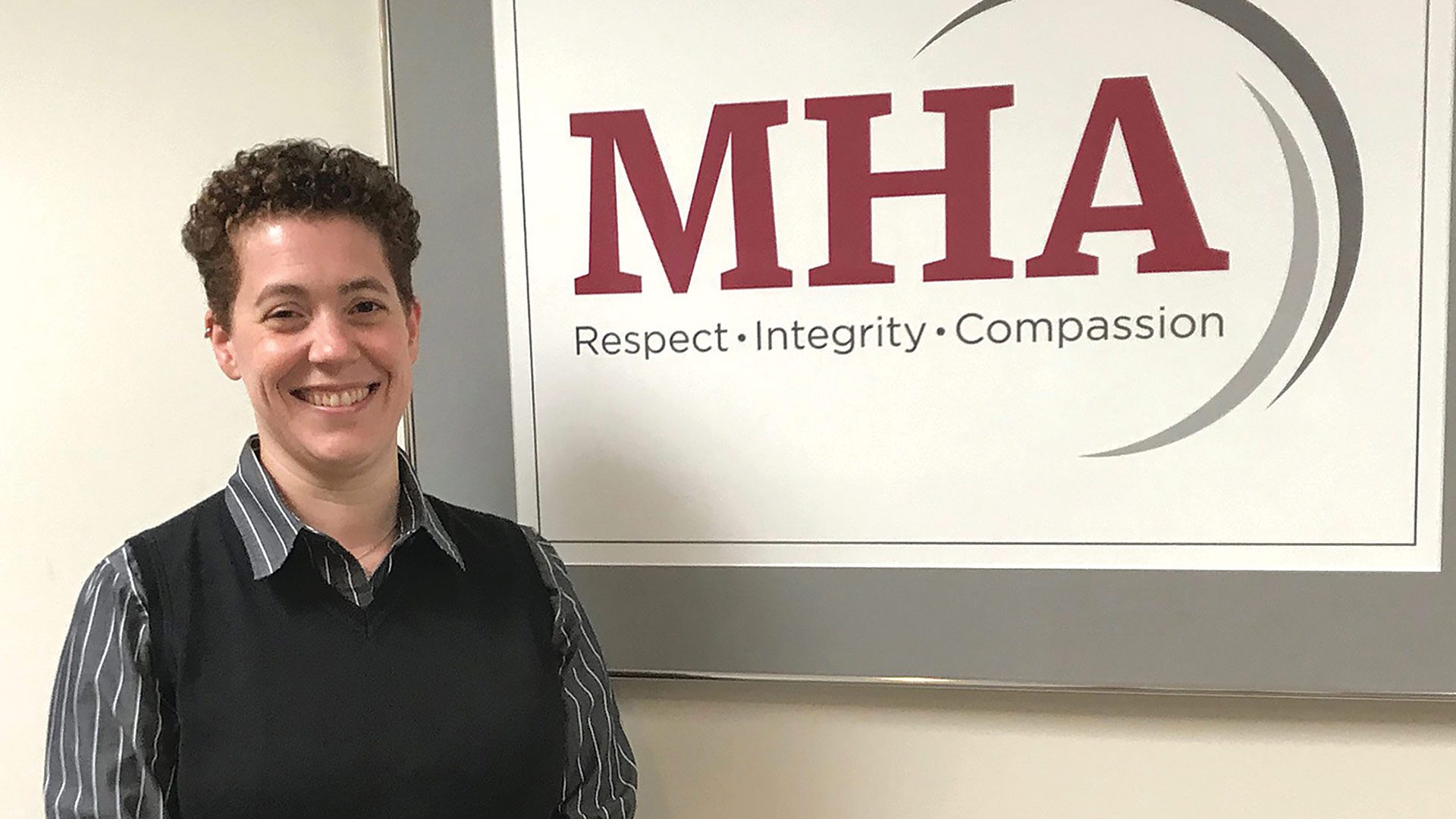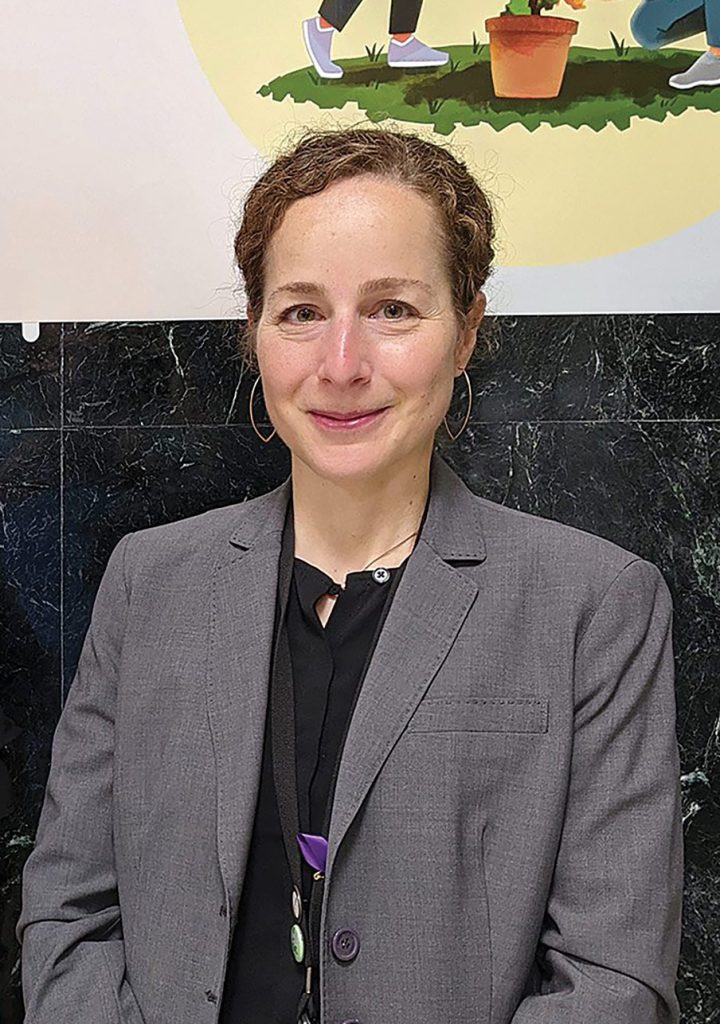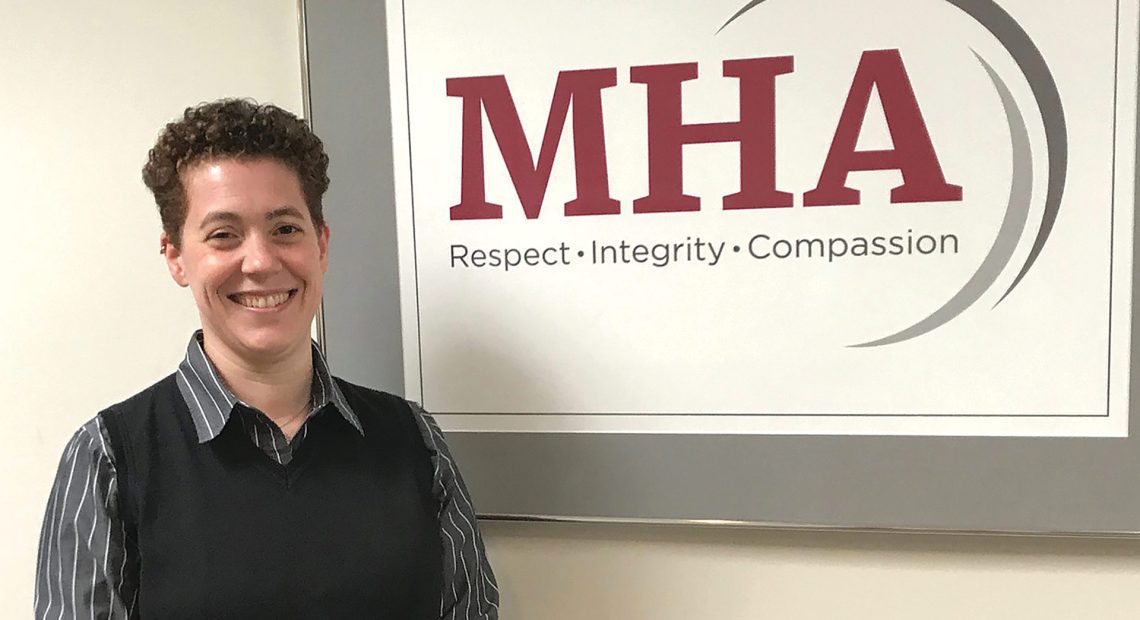Stemming the Tide

Christine Palmieri says economic tides, particularly around housing availability, have exacerbated the opioid epidemic.
When BusinessWest visited the Mental Health Assoc. (MHA) in Springfield last fall, Christine Palmieri reported what she called a “troubling” trend locally: more deaths by overdose, over the previous year or two, than she’d seen in her entire career.
She wishes she had different news to report now.
“Anecdotally, it hasn’t improved. We’ve lost a number of individuals over the course of this year to opioid overdose,” Palmieri, vice president of Recovery and Housing at MHA, said this month.
Earlier this year, the state reported a similar lack of positive news. Specifically, opioid-related overdose deaths in Massachusetts increased by 2.5% in 2022 compared to 2021, with 2,357 such confirmed and estimated deaths in 2022.
Breaking it down further, the data showed that non-Hispanic Black men saw their opioid-related overdose death rate increase 41%, from 56.4 to 79.6 per 100,000, while the rate for non-Hispanic Black women increased by 47%, from 17.4 to 25.5 per 100,000.
Some of the broader trends may track back to the isolation and loss of connection people were feeling during the pandemic, Palmieri said, but economic tides are more significant factors right now, from access to work to higher costs of food, transportation, and especially housing — key social determinants of health that hinder recovery.
“It’s a difficult environment to try to get better in now,” she told BusinessWest, noting that the state Department of Public Health (DPH) has begun investing significantly in housing programs for people experiencing substance abuse. Using funds from the state’s Opioid Recovery and Remediation Fund, DPH expects to increase low-threshold housing units — housing provided in conjunction with supportive recovery services — statewide from 394 to 761 this year.
“MHA and a lot of our colleagues have been benefactors of that funding, which helps get people off the street into a warm and safe place and on the path to recovery,” Palmieri said. “It’s hard to do the work of recovery if you don’t have a safe place to lay your head. Getting people off the streets into safe housing is critical. It’s the first step on the path to recovery.”
“It hasn’t improved. We’ve lost a number of individuals over the course of this year to opioid overdose.”
Among MHA’s transitional and permanent housing programs are three residences in its GRIT program, for individuals with co-occurring substance-abuse and mental-health diagnoses, which require no time limit on a stay as long as a resident is benefiting and engaging in the program.
“Housing is the biggest barrier for us in the mental-health world,” she added. “The thing that keeps people in programs longer than anything else is the lack of affordable housing. We don’t discharge people into homelessness; we help them land somewhere — sober houses, transitional houses, re-housing programs.
“That’s why funding from the state is so crucial. It allows us to subsidize housing costs for people with very low incomes who experience substance-use issues,” Palmieri added, noting that MHA also has relationships, often spanning decades, with local landlords. “When a unit becomes available, they’ll call us because they know the rent will get paid and that we’ll be there to support them with whatever they experience.”

Dr. Katie Krauskopf says everyone should have access to naloxone, the only intervention that can reverse an overdose.
Dr. Katie Krauskopf, medical director of Substance Use Disorder Services at MiraVista Behavioral Health Center in Holyoke, said her organization has expanded outpatient substance-abuse treatment services — both programs and operating hours — as well as broadening an effort to treat patients with co-occurring mental-health and substance-abuse issues through its inpatient psychiatric services.
“The work definitely continues,” she told BusinessWest. “We’re still seeing overdoses at high rates — and any overdose is too many. We’re also seeing an adulterated drug supply.”
And it’s not just fentanyl, she noted; the new additive on the street is a tranquilizer called xylazine, which is being detected in an increasing number of drug-overdose deaths.
“To address the opioid crisis, we need to prioritize overdose death prevention while simultaneously investing in comprehensive supports for those dealing with substance-use disorder, to ensure they have every opportunity for recovery,” Secretary of Health and Human Services Kate Walsh said when the DPH report was released. “We have to lean into the disparities we see in impacts on Black residents and target our interventions accordingly. Challenges like housing, hunger, and accessing education, behavioral-health treatment, and transportation need to be addressed in concert with substance-use treatment in order to turn the tide of this epidemic.”
Instant Intervention
To save lives while an overdose is in progress, the state, its municipalities, and organizations like MiraVista and Tapestry Health have worked in concert to make naloxone, also known as Narcan, more widely accessible, in order to reverse the deadly effects of an overdose as it’s happening.
For instance, the city of Greenfield recently announced that four naloxone boxes have been installed at Energy Park, Hillside Park, and the two Greenfield City Hall public restrooms, and the boxes will be refilled weekly by Tapestry.
This effort, spearheaded by the Opioid Task Force of Franklin County and the North Quabbin, Tapestry, the North Quabbin Community Coalition, and Boston Medical Center, is part of the National Institutes of Health’s HEALing Communities Study, which began in 2019 with 16 Massachusetts communities that qualified based on opioid overdose fatality rates.
The new naloxone boxes are part of the $800,000 the local task force received to finance opioid-related fatality-reduction strategies in Greenfield, Athol, Montague, and Orange. In addition, the task force and Tapestry continue to host virtual overdose-prevention and Narcan trainings.
“The city welcomes the opportunity to be a partner with Tapestry and the Opioid Task Force in this effective, life-saving, harm-reduction effort by allowing naloxone boxes to be available in our City Hall and public parks,” Greenfield Mayor Roxann Wedegartner said.
According to the DPH, Massachusetts has already exceeded, and plans to expand upon, federal naloxone ‘saturation’ goals, providing communities with enough naloxone to prevent overdose deaths that may occur from a lack of medication access. Since 2020, DPH has distributed close to 300,000 naloxone kits to harm-reduction programs, opioid treatment providers, community health centers, hospital emergency departments, and county houses of correction, with distribution increasing about 40% each year.
In 2022, the DPH launched the Community Naloxone Purchasing Program with the aim of increasing distribution of free naloxone through organizations to the community. Meanwhile, this past spring, in response to the rise in opioid-related overdose deaths, DPH issued an advisory urging healthcare providers to increase availability of naloxone kits and train staff to administer naloxone to anyone who may need it, and retail pharmacies to continue to dispense it without a prescription as part of a statewide standing order.
“Narcan is the only intervention we have to reverse an overdose. And if you have a medication that does that, everyone should have access to it. It does save lives,” Krauskopf said.
Roxann Wedegartner
“The city welcomes the opportunity to be a partner with Tapestry and the Opioid Task Force in this effective, life-saving, harm-reduction effort by allowing naloxone boxes to be available in our City Hall and public parks.”
Meanwhile, since August 2022, DPH has increased its distribution of rapid fentanyl test strip kits at no cost to providers and community organizations. Single-use fentanyl test strips help reduce the chances of overdose by allowing people who use drugs to test their supply prior to consumption to determine if it is tainted with fentanyl.
Other recent innovations in battling substance abuse range from medical — such as Sublocade, a long-acting injectable that has helped many patients keep off opioids — to regulatory, such as a move during the pandemic to allow patients to take home medications they could not previously, Krauskopf added.
Palmieri noted that the Western Mass. region — and the organizations within it that deal with addiction — do a good job of providing a wide spectrum of residential and outpatient services, from acute detox centers to medication-assisted treatment to recovery coaching.
“It’s vitally important that the community has options to meet everyone’s needs,” she added. “No one size fits all, and there are many different pathways to recovery.”
A Slowing Trend?
There is also, perhaps, some good news from the DPH’s recent study, which reported that, according to preliminary data, there were 522 confirmed and estimated opioid-related overdose deaths in the first three months of 2023, a 7.7% decrease (and an estimated 44 fewer deaths) from the same time period in 2022.
“Too many Massachusetts families, particularly families of color, have been impacted by this crisis,” Gov. Healey said at the time, “and in order to effectively respond, we need to address the gaps in the system by advancing long-term solutions that include housing, jobs, mental healthcare, and more resources for our cities and towns.”
And addiction doesn’t discriminate by the size of those cities and towns. According to the DPH report, the most rural communities in Massachusetts had the highest opioid-related overdose death rate in 2022 at 36.1 deaths per 100,000 residents.
However, Springfield was among the cities and towns that experienced notable increases in opioid-related overdose deaths in 2022 compared with 2021; others high on that list included Lawrence, Leominster, Lynn, Waltham, Weymouth, and Worcester.
“We know overdose deaths are preventable,” DPH Commissioner Dr. Robert Goldstein said. “The pandemic has had a devastating impact on mental health and substance use, especially among marginalized communities. We are working to reverse these troubling trends by continuing to build on our data-driven and equity-based approaches toward responsive support and treatment.”







